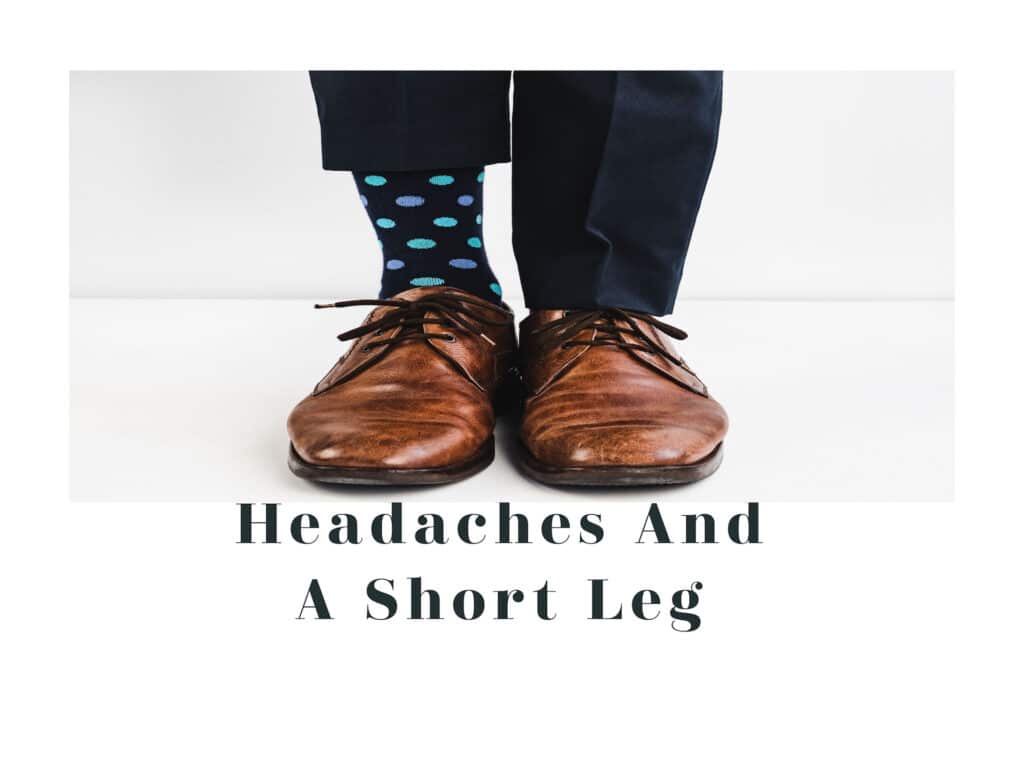How headaches and a short leg are related
Hip rotation can cause a host of issues throughout the body, and one of the most common is headaches. This can be due to the fact that a rotated hip can cause a difference in leg length, leading to imbalances in the spine and pelvis. These imbalances can result in tension in the muscles of the neck and shoulders, leading to headaches. Most people do not correlate these two because healthcare providers rarely look for the underlying cause of a symptom. Most in the medical community are too quick to treat the symptom with medication or only look at their specialty region. For example, a neurologist may focus on the brain and nervous system, while a physical therapist may focus on the musculoskeletal system. As a result, there may not always be an integration of care that considers the whole body and how different systems are interconnected.
Hip Rotation Causes A Short Leg
When the hips are rotated, it can cause one leg to be shorter than the other. This difference in leg length can cause the pelvis to tilt and the spine to curve, leading to postural imbalances that can put a strain on the muscles and ligaments of the back. Over time, this strain can cause pain and discomfort in the neck and shoulders, which can then lead to headaches. These headaches would be considered TENSION headaches.
One common cause of hip rotation is muscular imbalances in the hips and legs. For example, if the muscles on one side of the hip are tight and the muscles on the other side are weak, this can cause the hip to rotate. Additionally, sitting for long periods of time can also contribute to hip rotation, as it can cause the hip flexors to become tight and shorten.
Correct The Cause To Alleviate Headaches
To help alleviate headaches caused by hip rotation, it’s important to address the underlying muscular imbalances. This may involve stretching the hip flexors and strengthening the glutes and other muscles that support the hips and pelvis. Also, working on postural awareness and making adjustments to sitting and standing posture can also help alleviate tension in the neck and shoulders. Chiropractic has been proven to relieve tension headaches long term.
Chiropractic Adjustments Reduce Tension Headaches
A study published in the Journal of Manipulative and Physiological Therapeutics in 2002 found that patients with chronic tension-type headaches had a higher prevalence of cervical and thoracic postural abnormalities, including a decreased cervical range of motion and increased thoracic kyphosis. The study suggested that addressing these postural abnormalities through chiropractic care could help alleviate headaches.
A review published in the Journal of Back and Musculoskeletal Rehabilitation in 2019 found that postural abnormalities, including hip rotation, can lead to tension in the neck and shoulder muscles, which can cause headaches. The review suggested that addressing these postural abnormalities through targeted exercises and stretches could help reduce the frequency and intensity of headaches.
Overall, tension headaches can be a frustrating and debilitating condition, but there are treatment options available to help alleviate symptoms. Chiropractic care is one such option, and research suggests that it can be an effective treatment for tension headaches caused by postural imbalances such as hip rotation. By addressing postural imbalances through spinal manipulation, mobilization, and targeted exercises and stretches, chiropractors can help reduce tension in the neck and shoulders muscles, which can contribute to headaches. Research suggests that chiropractic care may be more effective than medication in the treatment of tension headaches. (1) (2) If you are experiencing tension headaches, consider consulting with a chiropractor to see if chiropractic care may be a safe and effective treatment option for you.
To schedule an appointment to see how Life Source Chiropractic in Omaha Nebraska can help you get back to living your best life, click HERE!
Sources:
- “Long-term relief from tension-type headache and major depression following chiropractic treatment”. J Family Med Prim Care. 2018 May-Jun; 7(3): 629–631. Eric Chun Pu Chu and Michelle Ng.
- Boline, P.D., Kassak, K., Bronfort, G., Nelson, C., Anderson, A.V. “Spinal Manipulation vs. Amitriptyline for the Treatment of Chronic Tension-Type Headaches: A Randomized Clinical Trial.” Journal of Manipulative and Physiological Therapeutics, 1995 Mar-Apr; 18(3): 148-154. https://www.ncbi.nlm.nih.gov/pubmed/7790794.


